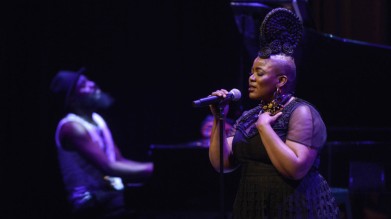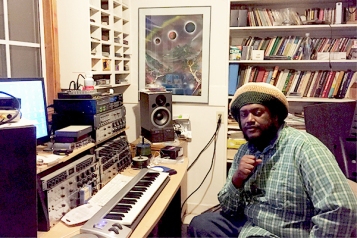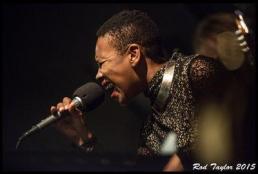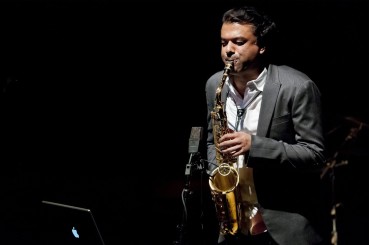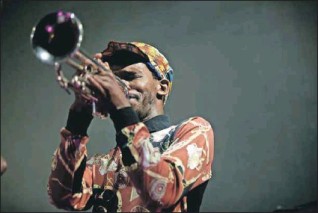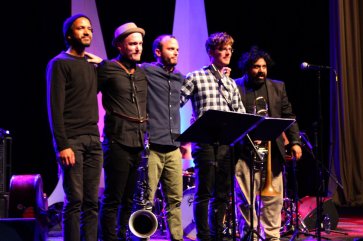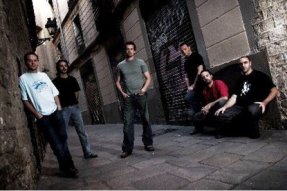 “I’m not a jazz musician,” guitarist/composer Vuma Levin asserts, about half way through our interview on his new release, Life and Death on the Otherside of the Dream (launching at the Afrikan Freedom Station on May 4, and featuring multiple South African players as well as his longtime European quartet).
“I’m not a jazz musician,” guitarist/composer Vuma Levin asserts, about half way through our interview on his new release, Life and Death on the Otherside of the Dream (launching at the Afrikan Freedom Station on May 4, and featuring multiple South African players as well as his longtime European quartet).
Denials like that crop up fairly regularly these days. Usually, the artist in question puts the emphasis on genre: jazz is too confining a label; jazz carries too much baggage. It’s much less usual to hear almost equal emphasis, as Levin places it, on the word ‘musician.’
Some of this stark self-assessment comes from what he sees as his late start in music and jazz.
“I started music late,” he explains. “Way too late, in fact. I was 20 and I had no natural affinity for playing. I look at some of my peers and see people who, even when they’re not practicing a lot, can pick up a sound, or know just how to use an instrument as a conduit for their music… Maybe because they were exposed to music from an early stage, they have more building-blocks in place than I had.”

That may, he concedes, be an idealisation, based on just how much practice-time his peers conceal behind a deliberately laid-back façade. Even so, it’s not how he is: he is frank about having to work relentlessly at his skill. And the work ethic persists. The title suite that occupies half the new album took him eight months to write; a process that entailed rigorously applying classical compositional technique to a gloriously eclectic set of raw materials and influences.
“My first exposure to jazz and playing were at the Tshwane University of Technology (TUT), through lessons with the late John Fourie, “ Levin recalls. “Earlier, the music I’d heard at home was the singer/songwriters of rock, from my parents’ collection. [Fourie] played me Nights in Tunisia. And I was like: ‘It’s just noise; a random collection of notes. Why do people listen to that? What’s the deal?’ It was only in my second year at TUT that I stated appreciating jazz. And it took me huge hours of practice.
“Then, for the longest time, my goal was to be the best guitarist in the world.” He smiles ruefully back at his own youthful (he’s now 30) hubris. “Well, that’s not going to happen.”
Such self-deprecation might seem like false modesty, especially if you’ve listened to Levin’s playing (see, for example, https://www.youtube.com/watch?v=6xpdp07K4kQ or hear his work on Rebirth, on this new album). He certainly makes good music, and in a jazz milieu emphatically not about popularity contests, “best in the world” was always irrelevant.
But it’s not that. Though Levin’s statements about what he is not do underplay his skill, they also embody an implicit and intriguing set of assertions about what he is. Those assertions are key to understanding album number two.
The word that keeps recurring is “conversation”.
Levin’s debut, The Spectacle of An-Other (http://mp3dlfree.info/track/211575784/kayafm959-vuma-levin-quintet-live-on-taos ), aimed to position him as a voice from a particular space. His landscape was the paradoxes and tensions between stereotypes of African identities and their reality, interwoven with reflections on the journeys and frontiers of his own life, including his responses to academia (Levin currently lectures part-time at Wits).
The music was interesting, but “I never intended it to be popular music, “ he explains, “and it didn’t aspire to earning big bucks.” Levin finds the idea of being in the public eye as a music star as unappealing as the idea of defending theses before panels as a scholar – that’s another aspect of “not being” a jazz musician.
Spectacle offered rich exposition, but it didn’t particularly exhort us to talk back, and that’s where Life & Death… is different. Equally ideas-driven, the sonic discourse is now occupying as much of the foreground as the social and political, and the sounds Levin employs are very consciously marshaled to draw us into the debate.
“I enjoy composing more than playing,” he says. “The music I enjoy listening to does a lot with the efficient use of basic materials. I consciously didn’t want this album to be heavy with solos. Rather, it’s compositionally dense, with recognisable popular music progressions. There’s a huge variety of influences, and I’m using them to negotiate a space in which I can talk to more kinds of people. Hopefully, the track titles contribute to that too. ”
To say that a “basic material” of music is sound itself may seem like stating the obvious. “But sound – call it texture if you like – as a parameter of music, is neglected,” says Levin. “An album like Pink Floyd’s Dark Side of the Moon is a sound-designed album. Radiohead use that approach. For Carlo Mombelli, sound is an extremely important affective part of his music. Maybe that’s also where my own composition is heading…”
Part of Levin’s focus on the uses of sound emerges in the way Life & Death…weaves sound-clips into the texture of tracks. One, Conversations, employs a digital sample of the sound of San speech.
It could, Levin agrees, be read as appropriation. “It’s meant to be an abstract representation of a conversation in post-apartheid South Africa, with the digital use of ‘clicks’ signifying both Africa and modernity, as a way of unpacking this idea of a ‘national conversation’.”
But, no, Levin did not seek permission from its subjects to use the clip. Even more questionably, it was sourced from YouTube, and he doesn’t actually know what the words mean.
“And I’m willing to be called out on that. In fact, if that happens, the track has served its purpose in starting, and making us listen to, necessary conversations. We need to view those conversations through multiple epistemic lenses. Because, remember” – here he turns my question about appropriation neatly back on me – “’What does it mean?’ is itself a very problematic question.”
That kind of conceptual challenge through sound – what Levin calls “music that makes a tangible connection between theory and practice” – is what he sees as the strength of his work. And if praxis is some of what that’s about, he also acknowledges “provocateur – by deliberately invoking/composing difference.”
Provocation is most likely to be identified by listeners in the title suite, which includes an extract from Thabo Mbeki’s I Am An African speech. Much as it is wonderful to recall the poetry and vision of Mbeki’s words, it’s hard now to hear them untarnished by the memory of, for example, the 300 000-plus Africans who died of AIDS under Mbeki’s folie de grandeur watch.
Levin’s ahead of me again. “In that speech, Mbeki presented an inspiring foundational principle for a post-colonial nation: a space where shared – even if antagonistic – histories, rather than genes, define who we are. It’s an idea you can also find in Homi Babha. Yes, that dream has run out of steam. So in one way the track is a celebration of it; in another, the sense of doom, the dark sonic stuff in the background, reflects mourning the end of it – realizing you’re not a kid any more.”
Levin says he’s not sure what the best conditions of reception for this new album will be, or how audiences will relate to it. He speculates about a different kind of music event, where conversation could be as important as playing and listening – and he might well find the scope to create that at the Afrikan Freedom Station.
But in terms of such goals, does the album work? Well, when I met up with Levin, discussion of the sound-sampled tracks significantly extended and deepened our interview. They certainly are conversation-starters, in exactly the way Levin intends.
But there’s other stuff on Life & Death…that works too: the stuff that new-album reviews more commonly cover. The eclecticism of the album’s sources make it a much quirkier ride than Spectacle.., with piquant sonic contrasts that can startle or make you smile.
Despite Levin’s disavowals, the stories the album tells please the ears as much as they provoke the mind. Those sampled human voices are a very effective tactic for starting literal and musical conversations. While the mood is often regretful (as in the lyrically sad A Necessary Pain) it’s not unvaried. The Maze and Rebirth have genuinely catchy hooks and rhythms interwoven with thoughtful soloing – Levin’s aim of limiting solos creates focus, not austerity. A String Struck, offers a very modernist look at a melodic theme Sipho Gumede and Menyatso Mathole might have enjoyed playing; End of the Rainbow marries wry satire with upbeat African jazz.
If I found myself hitting ‘replay’ quite a lot, it was because some tracks were so crammed with textures and ideas that they disrupted my customary attempts at focused, linear, listening. Levin would almost certainly consider that act of disruption no bad thing.







